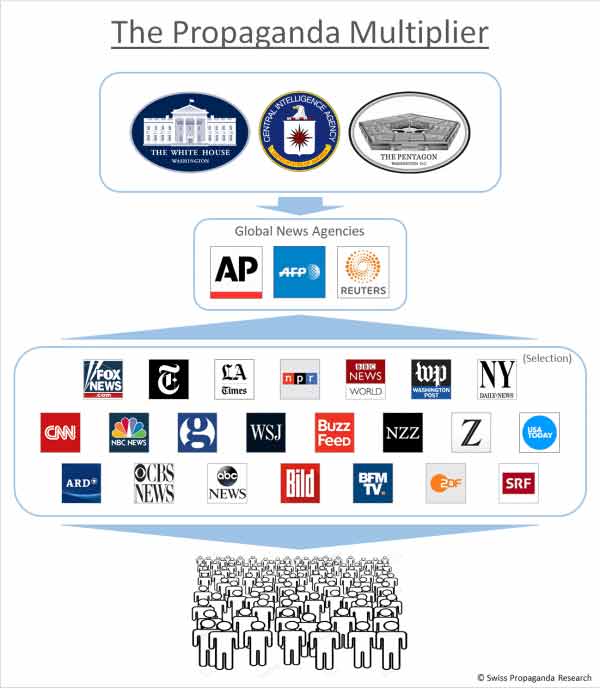by Dr. Joseph Mercola, Mercola:

STORY AT-A-GLANCE
- Most of the international news coverage in Western media is provided by three global news agencies — The Associated Press (AP), Reuters and Agence France-Presse (AFP)
- Until or unless at least one of these news agencies sends out a notice, national and local media are unlikely to report on an event. Even photos and videos are typically sourced directly from these global news agencies. This way, people hear, see and read the exact same message everywhere
TRUTH LIVES on at https://sgtreport.tv/
- Intelligence agencies and defense ministries are well aware of the power of these news agencies and use them with regularity. In 2009, then-president of the AP, Tom Curley, let it slip that the U.S. Pentagon has more than 27,000 PR specialists that spin up stories, and an annual propaganda budget of nearly $5 billion
- The rest of the technocratic apparatus uses these news agencies in the same way and for the same reasons — to proliferate certain narratives while burying or “debunking” others
- The Department of Homeland Security’s Cybersecurity and Infrastructure Security Agency (CISA) is partnered with a censorship consortium called the Election Integrity Partnership (EIP). Through this consortium, the DHS is illegally censoring Americans
Google promised to bring us the world, and for decades dished up tens of thousands of results to any given search. It was a clever trap. Get the world’s population hooked on an information monopoly, and then, when the time was ripe, funnel everyone toward specific narratives and hide everything else.
Google can do it because the primary way anyone “researches” a topic online is by using the Google search engine; Google controls well over 95% of the searches done on the internet across the entire planet. A similar trap was laid within the media landscape. As reported by Swiss Policy Research:1
“… most of the international news coverage in Western media is provided by only three global news agencies based in New York, London and Paris. The key role played by these agencies means Western media often report on the same topics, even using the same wording.
In addition, governments, military and intelligence services use these global news agencies as multipliers to spread their messages around the world. A study of the Syria war coverage by nine leading European newspapers clearly illustrates these issues: 78% of all articles were based in whole or in part on agency reports, yet 0% on investigative research.
Moreover, 82% of all opinion pieces and interviews were in favor of a US and NATO intervention, while propaganda was attributed exclusively to the opposite side.”
Propaganda on the one hand, and censorship on the other, are the primary battle strategies of the information war we now find ourselves steeped in. It’s imperative, then, to understand how these “weapons of war” against the public are being used, and by whom.
News Agencies Are the Invisible Propaganda Nerve Center
When it comes to the actual dissemination of fake news and propaganda, international news agencies play a central role and, as mentioned, there’s only three of them:
- The Associated Press (AP) — Headquartered in the U.S., with more than 4,000 employees worldwide, AP is relied upon by approximately 12,000 international media outlets and reaches more than half of the world’s population each day.
- Thomson Reuters — Reuters was originally headquartered in London, U.K., but was acquired by the Thomson Corporation in 2008. The two media companies merged and become the Thomson Reuters Corp., which employs more than 25,000 people in hundreds of locations worldwide.
- Agence France-Presse (AFP) — A quasi-governmental organization based in Paris, France, with about 4,000 employees, according to Swiss Policy Research,2 the AFP sends out more than 3,000 stories and photos each day to media companies around the world.
As once noted by Wolfgang Vyslozil, former managing director of Austria Presse Agentur (APA, Austria’s national press agency):3
“News agencies are rarely in the public eye. Yet they are one of the most influential and at the same time one of the least known media types. They are key institutions of substantial importance to any media system. They are the invisible nerve center that connects all parts of this system.”
Indeed, until or unless at least one of these news agencies sends out a notice, national and local media are unlikely to report on an event. Even photos and videos are typically sourced directly from these global news agencies. This way, people hear, see and read the exact same message everywhere.
Even media outlets that have foreign correspondents on their payroll do not expect those correspondents to conduct independent investigations. They too simply report whatever the Big Three news agencies want covered, and from the angle they want it covered.
What you end up with is a sort of echo chamber where only one view is presented. As one might expect, this setup makes for a perfect propaganda machine. As noted by Swiss Policy Research:4
“Due to the rather low journalistic performance of the mainstream media and their high dependence on a few news agencies, it is easy for interested parties to spread propaganda and disinformation in a supposedly respectable format to a worldwide audience.”
The Propaganda Multiplier
Intelligence agencies and defense ministries are well aware of the power of these news agencies and use them with regularity. In 2009, then-president of the AP, Tom Curley, let it slip that the U.S. Pentagon has more than 27,000 PR specialists that spin up stories, and an annual propaganda budget of nearly $5 billion.
Curley also stated that high-ranking U.S. generals had threatened to “ruin” him and the agency should AP journalists decide to take a critical stance against the U.S. military.5

The rest of the technocratic apparatus also uses these news agencies in the same way and for the same reasons — to proliferate certain narratives while burying or “debunking” others. Of course, we now also know that at least some of the world’s defense ministries are working on the Deep State’s behalf, so there’s not much separating them. Their narratives fit together like puzzle pieces.
In short, the current censoring and labeling of anything that threatens the globalist agenda as “misinformation” and “disinformation” is a top-down scheme, as illustrated6 above. It’s not random, by any means, and it’s not driven by the opinions of private companies themselves. Social media companies, for example, are mere tools for the technocratic deep state, which operates worldwide.
That said, many of the key media personalities are also part of the globalist network.7 Just look at the membership rosters of the World Economic Forum (WEF), the U.S. Council on Foreign Relations (CFR), the Bilderberg Group and the Trilateral Commission, just to name a few.
You’ll find many prominent journalists, editors and publishers. As insiders, they don’t have to be told what to report. They already know what the agenda is, and the narrative that will further that agenda.

Download this Article Before it Disappears
Why News Outlets Don’t Let You in on Their Sources
The reason most people have no idea that their local or favored news media are simply regurgitating the same story as everyone else is because, except for print newspapers, where you’ll notice a tiny acronym in parentheses in the dateline, media rarely name their sources. If they did, you’d quickly notice the pattern.
At that point, you’d realize that few if any news reports have actually been independently researched, and this, of course, is a perception they don’t want you to have.
You can find these sources if you know where to look, but they’re still too cryptic to interpret for most. As mentioned, the news agency that circulated the story and occasionally the agency editor that edited the report are typically listed at the top or bottom of the article in abbreviated form, within parentheses.
Media specialists are usually the only ones who know how to decipher these references, but if you know the abbreviation of three international agencies — AP, Reuters and AFP — you will at least know that a news agency created the story.
Fabricated Media Narratives Shape Public Opinion
Sometimes media companies will use an agency’s story without attribution, however, and/or they may simply rewrite it slightly to make it appear like an independent contribution. Still, the vast majority of news stories — including accompanying photos and videos — are sourced from the Big Three.
“In the end, this dependency on the global agencies creates a striking similarity in international reporting: from Vienna to Washington, our media often report the same topics, using many of the same phrases — a phenomenon that would otherwise rather be associated with ‘controlled media’ in authoritarian states,” Swiss Policy Research writes, adding:8
“Dependence on global agencies is also a major reason why media coverage of geopolitical conflicts is often superficial and erratic, while historic relationships and background are fragmented or altogether absent …
Finally, the dominance of global agencies explains why certain geopolitical issues and events … are not mentioned in our media at all: if the agencies do not report on something, then most Western media will not be aware of it.
As pointed out on the occasion of the 50th anniversary of the German DPA [the German national press agency]: ‘What the agency does not report, does not take place …
While some topics do not appear at all in our media, other topics are very prominent — even though they shouldn’t actually be: ‘Often the mass media do not report on reality, but on a constructed or staged reality. Several studies have shown that the mass media are predominantly determined by PR activities …'”
‘Homeland Security’ Is Now All About Propaganda
In mid-November 2020, then-President Donald Trump fired Chris Krebs, director of the Department of Homeland Security’s (DHS) Cybersecurity and Infrastructure Security Agency (CISA), after Krebs declared the 2020 election “the most secure election in U.S. history.”9



